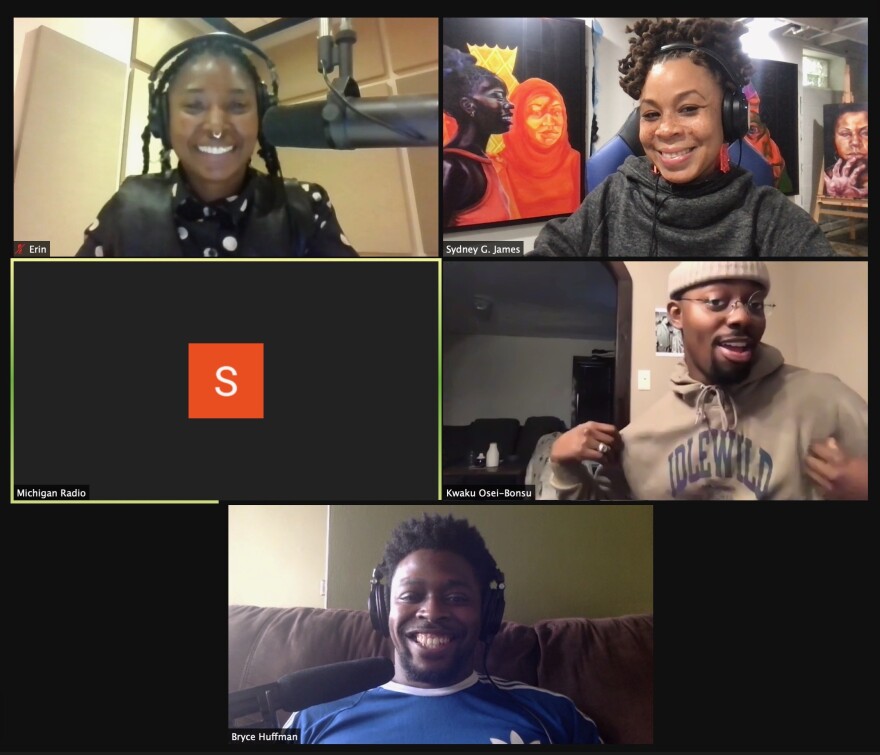Reporter Bryce Huffman said that the first time he can remember changing his speech to fit in among a group of white peers was around age nine, during a summer day camp in Royal Oak.
“I didn't realize that I was even doing it until someone called me out on it in, like, high school” Huffman said.
Restauranteur Kwaku Osei-Bonsu, who grew up in Oak Park, said he observed the habit in his early teens after joining a new dance studio in Berkeley to pick up skills in ballet as well as tap.
“My vernacular had definitely switched up, and to the point where my mom noticed that the tone of my voice when I would speak to them was higher,” Osei-Bonsu said. “I'd be exhausted. Not just because I danced, but because I had been puttin’ on for hours.”
And fine artist Sydney James remembered learning to code switch around age eight, after her mom moved her to a majority white elementary school in Hamtramck. She said she got teased by girls there for speaking the way she spoke at home, but also by her cousins for the adaptations she made at school.
“They would say stuff like, ‘Oh, why you talkin' so white? You went to that white school, now you talkin' so white.’”
Choosing between calling friends “homies” or “buddies?” Saying “gonna” or “finna?” Bringing up Kobe Bryant versus Allen Iverson or talking about the Red Wings versus the Avalanche? Code switching has involved constant decisions like these about word choice, syntax, tone, subject matter, and gesticulation for Huffman, Osei-Bonsu, and James.
Sometimes, they said, these choices to fit in or match someone else’s communication style come naturally. Sometimes, the effort is deliberate. And sometimes, code switching is both unconscious and exhausting, as it was for Osei-Bonsu at the dance studio.
What distinguishes code switching from other forms of linguistic adaptability, like speaking differently at the office versus during a night out with friends?
A key element of what makes code switching different for these three Detroiters is an enormous sense of pressure to perform the sound of stereotypical whiteness or stereotypical Blackness.
“It makes me hunch my shoulders because it's like, it also feels rooted in survival, you know what I mean?” said Osei-Bonsu. “Like, ‘in order for me to thrive in this space, I have to do this,’ because of the fear that, like, my whole self won't be accepted.”
“I think code switching is really changing your behavior to make somebody, specifically, to make a group feel comfortable,” said James. “Why do we have to put so much, put so much effort into making other people comfortable that don't even care about us?”
James said she now avoids code switching as much as possible. She’s chosen to speak the African American Vernacular English she grew up with at home and consciously opts out of unwelcoming places. That included forgoing a career in corporate America. She said she hopes the visibility and the success of people who don’t code switch, like Cardi B, will help create more inclusive environments.
Huffman noted that not code switching can be more difficult or feel more inauthentic. He said that in the places where he’s most at ease, he embraces his multiple ways of speaking.
“When I'm around my friends who, you know, range in racial, demographic, and socioeconomic status,” Huffman said, “all of my versions of myself and all of the versions of my voice will come out at some point, right?”
Although Osei-Bonsu, James, and Huffman each prefer to speak in unique ways, all three agreed Black people should feel able to sound like themselves in whatever spaces they inhabit.
“When you're acting as someone else,” Osei-Bonsu said, “life becomes theater in a way that begs the curtains to close, and I ask, when is the show over and when can one rest?”
——
Additional music by Blue Dot Sessions.
Looking for more conversations from Stateside? Right this way.
If you like what you hear on the pod, consider supporting our work.
Stateside’s theme music is by 14KT.














